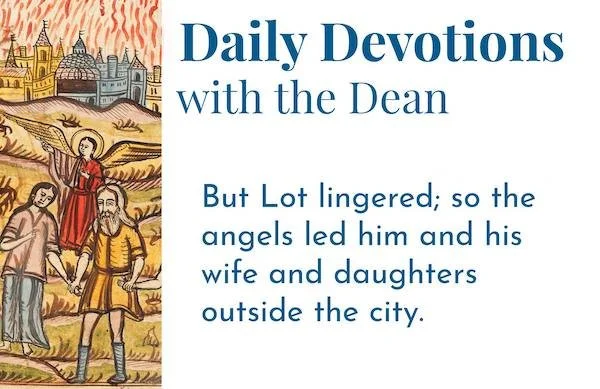Monday • 1/29/2024 •
Monday of 4 Epiphany, Year Two
This morning’s Scriptures are: Psalm 56; Psalm 57; Genesis 19:1–17(18–23)24–29; Hebrews 11:1–12; John 6:27–40
This morning’s Canticles are: following the OT reading, Canticle 9 (“The First Song of Isaiah,” Isaiah 12:2–6, BCP, p. 86); following the Epistle reading, Canticle 19 (“The Song of the Redeemed,” Revelation 15:3–4, BCP, p. 94)
Welcome to Daily Office Devotions, where every Monday through Friday we explore that day’s Scripture readings, as given in the Book of Common Prayer. I’m Reggie Kidd. Thanks for joining me this Monday in the Fourth Week After Epiphany, in Year Two of the Daily Office Readings.
“There are two ways, one of life and one of death, and there is a great difference between these two ways.” So begins The Didache, a guide that 1st-century Jewish Christians developed to introduce newly converted Gentile believers to the basics of their new life in Christ.* The statement crystallizes a life-premise that runs from Psalm 1’s contrast between “the way of the righteous” and “the way of the wicked” (Psalm 1:6) to Jeremiah’s, “…setting before you the way of life and the way of death” (Jeremiah 21:8).
Today’s reading in Genesis 19 illustrates graphically and horribly “the way of the wicked.” By contrast, today’s reading in Hebrews 11 illustrates crisply and elegantly “the way of the righteous.”
Genesis: the way of the wicked. In Genesis 18, Yahweh promised he would spare Sodom and Gomorrah if ten righteous people could be found. The text of Genesis 19 goes out of its way to stress that each and every male individual of Sodom and Gomorrah is corrupt beyond comprehension: they attempt to force sex with the visiting messengers, a violation of universal laws of hospitality and certainly of Jewish scruples about sex and rape.
Lot has worked hard to win a place in the city: at first, he had merely “pitched his tents near Sodom;” then, he had “settled in Sodom;” and eventually, he had earned a place of “sitting in the gate” where he could participate in civic affairs (Genesis 13:12; 14:12; 19:1). But Sodomites never let him fully “in.” To them, he is still an outsider. When he protests the Sodomites’ demand that he let them have their way with his guests, they shout, “This fellow came here as an alien, and he would play the judge! Now we will deal worse with you than with them” (Genesis 19:9).
Lot’s lamentable willingness to surrender his daughters to the violent and lustful mob and his pathetic reticence to leave so corrupt a place illustrate how deep is his need for the mercy of Yahweh. He’s become so accustomed to the “way of wickedness” that it’s only God’s determined love that can pluck him out: “But [Lot] lingered; so the [messengers] seized him and his wife and his two daughters by the hand, the LORD being merciful to him, and they brought him out and left him outside the city” (Genesis 19:16). Lord, have mercy! Who doesn’t see a bit of themselves in this portrait?
Image: Picu Pătruţ, Public domain, via Wikimedia Commons, The Romanian Peasant Museum, 1842
Hebrews 11: the way of the righteous. The right path in life is “faith.” To be sure, faith proves itself by actions: “By faith Abel offered … By faith Noah … built an ark … By faith Abraham obeyed when he was called to set out … By faith he stayed … in the land he had been promised … By faith he received power of procreation….” But in its essence, faith is more a direction of the heart than it is an accumulation of deeds. It is the disposition of receptivity, an intuition that from the other side of ordinary, everyday existence there is a Reality, in fact, a Presence, that shines through.
The writer to the Hebrews declares that faith is a trust that God exists and that he “rewards those who seek him” (Hebrews 11:6)—rewards them with a taste of supernal pleasure, with the sound of angels’ wings, with a vision of blessedness, with the scent of holiness, and with the touch of a hand from another country (thank you, C. S. Lewis). Faith is a knowing in your “knower” truths not available to the senses: “the assurance of things hoped for, the conviction of things not seen” (Hebrews 11:1).
John 6: faith in the Bread from heaven. In C. S. Lewis’s The Pilgrim’s Regress, the pilgrim’s journey begins with the vague sense that there is an island somewhere to which he needs to get. That’s a lot of what faith is: an instinct, an intuition, an itch of the inner being that puts you on a path towards something you suspect is wondrous. The Bible says, “Follow that path, and delight will meet you.” Oops, nope, it actually says, “Delight will meet you, for Delight has already set out for you.” In fact, He describes Himself as “Bread from Heaven.” It’s in John 6 that perhaps more clearly than anywhere in Scripture the God of the Island of Delight says: “I’ve come to be food for your soul.”
Be blessed this day,
Reggie Kidd+
* Adopting the analysis of Aaron Milavec, in his The Didache: Text, Translation, Analysis, and Commentary (Collegeville, MN: Liturgical Press, 2003).



